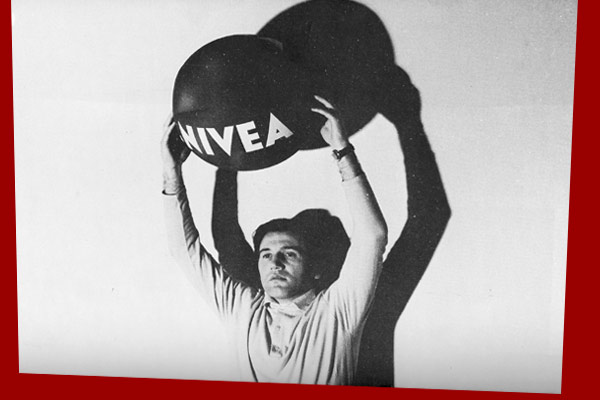

“Nothing was visible on the screen.
But pictures were streaming from
the speakers. Film audiences no
longer trusted their eyes. Was this a
fraud, a trick or magic?”
- Michael Cornelius, Süddeutsche Zeitung
Weekend (Wochenende, 1930), by German filmmaker Walther Ruttmann, is an early oddity in the history of cinema: a work intended to be presented in a darkened theatre, but containing no image, only a soundtrack. At the time it was made Weekend was presented in cinemas across Germany with success, and later it received radio airplay as well. Film Without Film is a historical selection of works that continue along the potential line of development that stopped at Weekend. The works included in the programme have been created without using moving images produced by means of film or video. What is essential is the darkened auditorium, the screen, and the notion of the act of watching a film.
Walther Ruttmann became known as a groundbreaking avant-garde pioneer already before Weekend. His Lichtspiel Opus I (1921) is one of the first abstract films made in the world, while his documentary Melodie der Welt (1929) the first German feature film with sound. Ruttmann’s international breakthrough was the futuristic city opus Berlin: Symphony of the City (Berlin – die Sinfonie der Großstad, 1927). After Weekend Ruttmann, however, changed his direction completely by abandoning avant-garde projects and enlisting himself in the service of Nazi propaganda, as both an advisor to Leni Riefenstahl and the director of films such as Die Deutsche Waffenschmiede (1940) and Deutsche Panzer (1940).
Weekend was created using optical sound film, a technology that had just become available, by splicing together small pieces of sound material in the editing table. The eleven-minute work is a sound collage, which depicts the angst of an unnamed protagonist (Ruttmann’s own voice) in an anonymous metropolis. We hear the mechanical sound of a typewriter, unconnected fragments of conversations, the roaring of a racing car, the protagonist trying to make a telephone call – in vain... a small child cooing, a metalworks thudding, soldiers marching, whistles of factories blowing, noise, from various sources. The checkout queue of a grocery store... Scenes follow one another at a breakneck speed, are cut off, and spliced into new scenes and fresh associations. Only a retreat to the countryside brings tranquility for the troubled protagonist. Weekend still sounds like a very apt portrayal of the modern, urban way of life.
The other works included in the programme are experimental pieces that test and break the limits of the cinematic apparatus, and approach the concept of cinema using various strategies and techniques. Among them are faithful reconstructions of historically significant performances in the genre of expanded cinema (Nivea and zzz: hamburg special), early interactive cinema à la Ernst Schmidt jr. (Hells Angels), conceptual films (Instant Film, Nothing) and brand new commissioned pieces from some of our favourite artists (Mark Boswell, Ian Helliwell and Malcolm Le Grice). The programme climaxes with the screening of Anthony McCall’s Line Describing a Cone, a classic piece of “happening cinema” previously unseen in Finland.
Because of the exceptional nature of the programme, further details about the works to be presented are withheld.
Ernst Schmidt jr Hells Angels (1968, Austria, 10 min)
Walther Ruttmann Wochenende (1929, Germany, 11 min 17 sec)
Peter Weibel Nivea (1967, Austria, 1 min)
Ian Helliwell May 2nd 2004, 3.30 am (2004, UK, 3 min 30 sec)
Malcolm Le Grice BorB (2004, UK, 8 min)
Hans Scheugl zzz: hamburg special (1968, Austria, variable duration)
Mark Boswell JFK (2004, USA, 5 min)
Ernst Schmidt jr. Nothing (1971, Austria)
Anthony McCall Line Describing A Cone (1973, UK, 30 min)
Peter Weibel/Valie Export Instant Cinema (1968, Austria, variable duration)
Film without Film in the Kiasma Theatre on Sunday, 21st November, at 14.00.